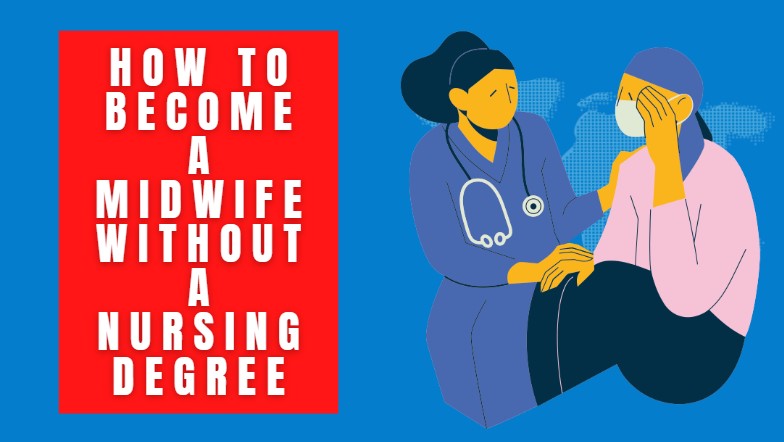how to become a midwife without a nursing degree
One of the most popular questions online is, “how to become a midwife without a degree.” Midwives are versatile in that they can do their job in any environment and offer their patients a unique healthcare service, which explains why. They ensure the baby is delivered safely while keeping track of a woman’s pregnancy. Although this profession is in high demand, does it require a degree or A Levels to pursue it? Those who don’t have a nursing degree do not have to give up hope; they still have options.
You can obtain an MSN in midwifery and nursing based on your current educational qualifications. A couple of universities offer two-and-a-half-year accelerated degrees. In some situations, you can also take part in remote learning and receive a Bachelor of Midwifery with Honors within this time.

How to Become a Midwife Without a Nursing Degree (Step by Step)
Can I begin my career as a midwife without having a nursing degree? You most definitely can! You can achieve this by applying your current knowledge, expertise, and intuitive skills.
The section offers an in – depth, step-by-step guide for a rewarding career as a midwife, which is a great way to “pursue your dreams” while also carrying out acts of kindness.
Let’s say you want to work as a midwife but don’t have the necessary training. In this scenario, you can enroll for a midwifery degree without A-levels by obtaining an Access to Higher Education Diploma online.
Why not pursue your dream of becoming a midwife? The fact that there are no age restrictions means that it is never too late to begin.
Since there is a country-wide short supply of midwives, now would be the perfect time to start your online Access to Higher Education Diploma (Midwifery).
Get the necessary education.
Decide on the kind of midwifery certification you wish to seek and wrap up the relevant bachelor’s degree or science curriculum. To complete a wide array of key courses, consider gaining a Bachelor of Science in Nursing degree or any diploma in a similar health science course.
It is compulsory to finish a midwifery education program in order to qualify as a midwife.
Submit an application to a U.S. midwifery school that perfectly matches your current educational qualifications.
Your application will shine if you have experience as a registered nurse or midwife, and you’ll be better prepared for the curriculum and training in a graduate-level midwifery course.
During your program, get practical experience by assisting with birth deliveries and witnessing them under the guidance of a certified midwife.
Read: Why I Left the Episcopal Church
Pass Certification Exams
You must pass the relevant exams after receiving your degree in order to be fully qualified and submit an application for licensing in your state.
Gain beneficial experience
Before or during your graduate studies, volunteering as a nurse or working in another clinical setting may assist you in getting ready for a career as a midwife.
You can enhance your interpersonal, communication, and problem-solving skills by learning from medical professionals at work and attending to patients.
Apply for Employment as a Midwife
Create a comprehensive résumé that lists all of your relevant academic experience, including undergraduate and graduate coursework. Add details about your supervised clinical and other practical medical experience. There are plenty of opportunities for employment in healthcare facilities, including hospitals, clinics, and maternity care centers.
What is a Midwife and What Do They Do
A midwife is a healthcare professional who assists women before, during, and after pregnancy and birth. Midwives help deliver newborn babies in numerous settings, including health facilities, private residences, and maternity centers.
Their primary goals are to keep an eye on women ‘s wellbeing, comfort, and safety when giving birth while avoiding unnecessary medical interventions.
Midwives can also counsel, inform, and talk to moms-to-be and new moms about the pregnancy, birthing process and what comes next.
The standard duties of a midwife include:
- Carrying out routine gynecological checkups.
- Offering prenatal and antenatal care.
- Offering advice and information on breastfeeding, pregnancy health, diet, exercise, fertilization, and child care.
- Helping with delivery and labor
- They counsel women about their options for giving birth and which is suitable for their unique circumstances.
- Provide post-delivery follow-up services.
What are some skill sets a midwife should have?
Communication skills
A midwife must have strong communication skills since you’ll be having conversations with women in labor every time. If they’re having trouble or are in a danger, you must identify their needs and help them.
Language skills
Naturally, most of the pregnant women you work with will speak English, but you have to be ready in case a tourist or migrant needs assistance with labor. In that case, it would be great if you knew a different language that they could understand.
Risk Management
Every pregnancy is unique, and some women may experience more difficult deliveries. You’ll have to be able to respond fast and make critical judgments for the sake of the mom and the unborn child.
Empathy
This might be one of the most crucial feelings and soft skills you need to possess. Understanding and having empathy with a woman’s challenges throughout pregnancy is crucial because it affects both her physical and mental state.
Problem-solving
Issues or potential inconveniences are almost always present during labor. You have to be prepared to confront that issue head-on.
Frequently Asked Questions
We put together a list of frequently asked questions about becoming a midwife.
How Long Does It Take to Become a Midwife?
Typically, it takes 4 to 6 years to qualify as a midwife. Starting from scratch, becoming a midwife takes roughly 6 years, when you factor in undergraduate coursework, internships, and a master’s degree.
Some registered nurses with associate degrees are given consideration for the master’s and internship programs in midwifery, which can take up to four years to complete and last anywhere from 18 months to two years.
What Kind of Pay Does a Midwife Get?
Midwives make a yearly salary of roughly $101,445 according to indeed.com. However, this yearly payment varies from state to state
Midwives are in greater demand in some areas than others. This has an impact on their wages.
Where Can You Work as a Midwife?
Clinics, private residences, doctor offices, maternity centers, specialized private facilities, and others are just a few of the healthcare establishments where midwives work.
How can I start a midwifery career?
You have to earn a three-year midwifery degree in order to work as a midwife. The course can be completed in 18 months if you are a certified nurse.
What school is best for studying midwifery?
- Vanderbilt University, Nashville, TN.
- Oregon Health and Science University, Portland, OR.
- University of Michigan, Ann Arbor, MI.
- University of Pennsylvania, Philadelphia, PA.
- University of Minnesota – Twin Cities, Minneapolis, MN.
- University of Washington, Seattle, WA.
Is training to become a midwife challenging?
Midwifery courses are among the toughest university courses to study, primarily because they seem incredibly popular and receive lots of applicants for limited spaces each year.
